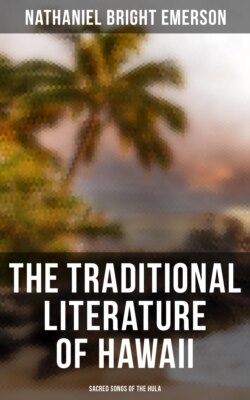Читать книгу The Traditional Literature of Hawaii - Sacred Songs of the Hula - Nathaniel Bright Emerson - Страница 21
На сайте Литреса книга снята с продажи.
[Translation]
ОглавлениеA Name-Song, a Eulogy (for Naihe)
The huge roller, roller that surges from Kona,
Makes loin-cloth fit for a lord;
Far-reaching swell, my malo streams in the wind;
Shape the crescent malo to the loins--
5
The loin-cloth the sea, cloth for king's girding.
Stand, gird fast the loin-cloth!
Let the sun guide the board Ilalepó,
Till Halepó lifts on the swell.
It mounts the swell that rolls from Kahiki,
10
From Wakea's age enrolling.
The roller plumes and ruffles its crest.
Here comes the champion surf-man,
While wave-ridden wave beats the island,
A fringe of mountain-high waves.
15
Spume lashes the Hiki-an altar--
A surf this to ride at noontide.
The coral, horned coral, it sweeps far ashore.
We gaze at the surf of Ka-kuhi-hewa.
The surf-board snags, is shivered;
20
Maui splits with a crash,
Trembles, dissolves into slime.
Glossy the skua of the surf-man;
Undrenched the skin of the expert;
25
Wave-feathers fan the wave-rider.
You've seen the grand surf of Puna, of Hilo.
This spirited song, while not a full description of a surf-riding scene, gives a vivid picture of that noble sport. The last nine verses have been omitted, as they add neither to the action nor to the interest.
It seems surprising that the accident spoken of in line 19 should be mentioned; for it is in glaring opposition to the canons that were usually observed in the composition of a mele-inoa. In the construction of a, eulogy the Hawaiians were not only punctiliously careful to avoid mention of anything susceptible of sinister interpretation, but they were superstitiously sensitive to any such unintentional happening. As already mentioned (p. 27), they believed that the fate compelling power of a word of ill-omen was inevitable. If it did not result in the death of the one eulogized, retributive justice turned the evil influence back on him who uttered it.
32. Lu ka hua. Casts now its seeds. The maile vine (pl. IV), one of the goddess's emblems, casts its seeds, meaning that the goddess gives the pupils skill and inspires them.
33. Mo'o-helaia. A female deity, a kupua, who at death became one of the divinities, au-makua, of the hula. Her name was conferred on the place claimed as her residence, on Mauna-loa, island of Molokai.
34. Ohia-Ku. Full name ohia-ku-makua; a variety of the ohìa, or lehua (pl. XIII), whose wood was used in making temple gods. A rough stem of this tree stood on each side near the hala-pepe. (See pl. III, also pp. 19–20.)
35. Mauna-loa. Said to be the mountain of that name on Molokai, not that on Hawaii.
36. Kaulana-ula. Full form Kaulana-a-ula; the name of a deity belonging to the order, papa, of the hula. Its meaning is explained in the expression ula leo, in the next line.
37. Ula leo. A singing or trilling sound, a tinnitus aurium, a sign that the deity Kaulanaula was making some communication to the one who heard it.
"By the pricking of my thumbs Something wicked this way comes."
38. Naihe. A man of strong character, but not a high chief. He was horn in Kona and resided at Napoopoo. His mother was Ululani, his father Keawe-a-heulu, who was a celebrated general and strategist under Kamehameha I.
39. Mahiehie. A term conferring dignity and distinction.
40. Onaulu-loa. A roller of great length and endurance, one that reaches the shore, in contrast to a Kalcala.
41. Kalai. An archaic word meaning forty.
42. Hooka. A crescent; the name of the second day of the month. The allusion is to the curve (downward) of a large number(kakai) of malo when hung on a line, the usual way of keeping such articles.
43. Malo kai. The ocean is sometimes poetically termed the malo or pa-á of the naked swimmer, or bather. It covers his nakedness.
44. Ka'ika'i. To lead or to carry; a tropical use of the word. The sun is described as leading the board.
45. Hale-pó. In the opinion of the author it is the name of the board. A skilled Hawaiian says it is the name given the surf of a place at Napoopoo, in Kona, Hawaii. The action is not located there, but in Puna, it seems to the author.
46. Kahiki. Tahiti, or any foreign country; a term of grandiloquence.
47. Wakea. A mythical name, coming early in Hawaiian genealogies; here used in exaggeration to show the age of the roller.
48. Ho'ohua. Applied to a roller, one that rolls on and swells higher.
49. Opu'u. Said of a roller that completes its run to shore.
50. Kua-pá. Said of a roller as above that dies at the shore.
51. Maka-kai. The springing-up of the surf after an interval of quiet.
52. Kakála. Rough, heaped up, one wave overriding another, a chop sea.
53. Hiki-au. Said to be the name of a temple.
54. Kuhihewa. Full name Ka-kuhi-hewa, a distinguished king of Oahu.
55. O iu. Meaning that the board dug its nose into the reef or sand.
